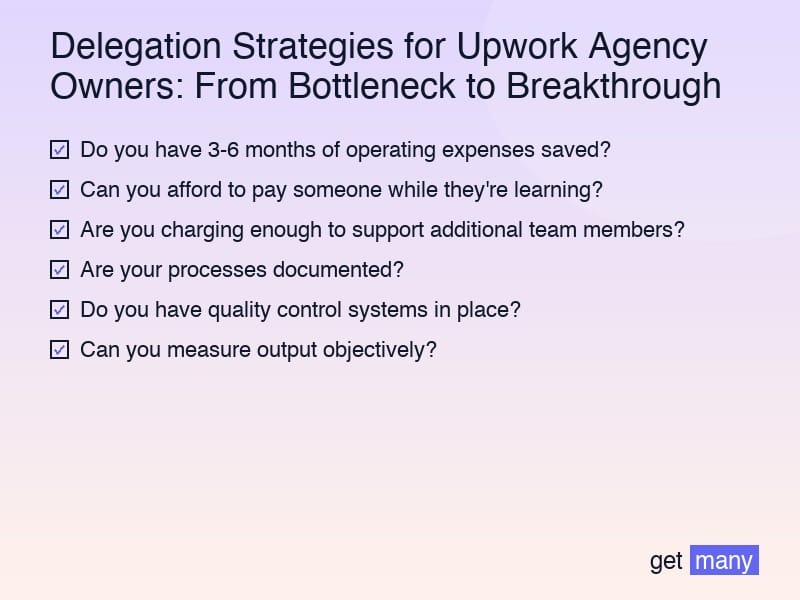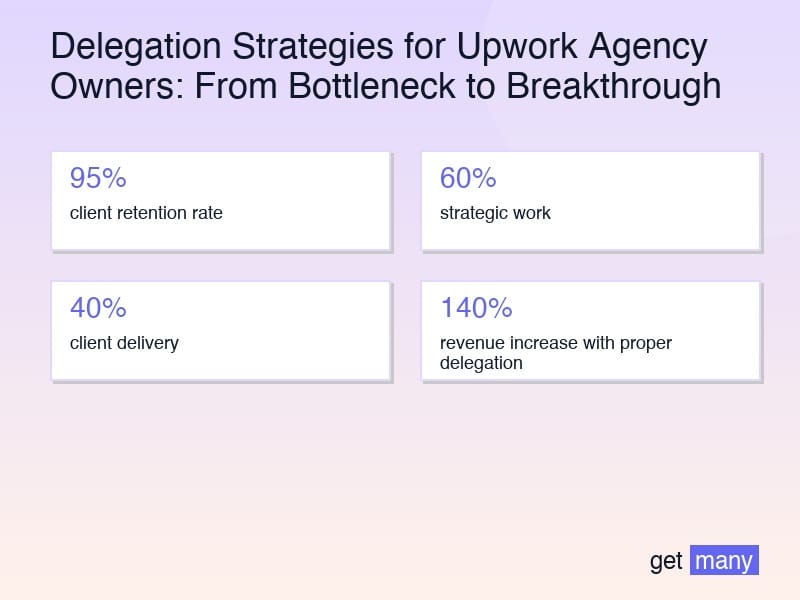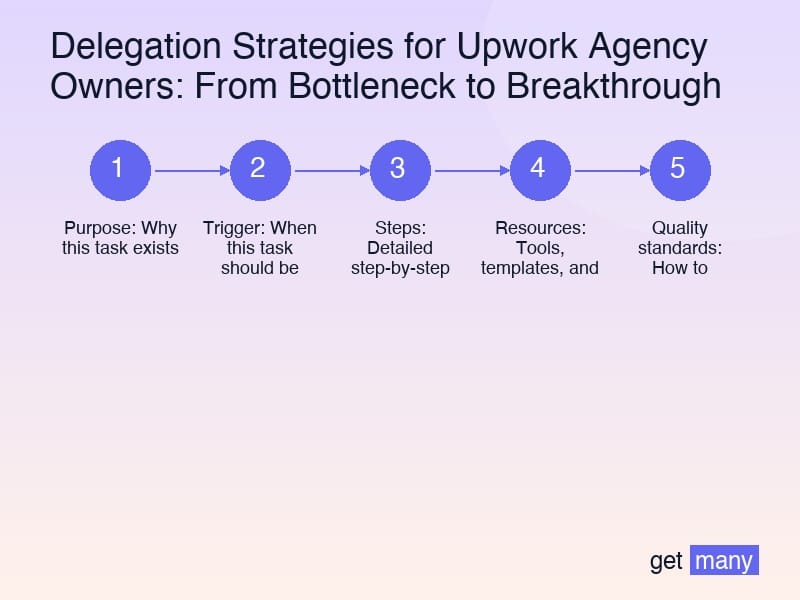Delegation Strategies for Upwork Agency Owners: From Bottleneck to Breakthrough
Stop being your agency's biggest bottleneck. Learn the proven delegation frameworks that let successful agency owners scale beyond their personal capacity.

The paradox of agency growth is brutal: The very control that helped you succeed as a freelancer becomes the ceiling that limits your agency's potential. Most agency owners become prisoners of their own success, trapped in a cycle of micromanagement that prevents true scaling.
After working with 300+ agency owners, I've identified the exact delegation strategies that separate the six-figure agencies from the seven-figure ones. The difference isn't in the quality of their team—it's in the systems they use to multiply their effectiveness through others.
The Delegation Dilemma: Why Smart People Struggle to Let Go

Before we dive into solutions, let's address the elephant in the room: Why do intelligent, successful agency owners struggle so much with delegation?
The Perfectionist's Trap
"I can do it faster/better myself" is the most expensive thought in business. While true in the short term, this mindset creates a bottleneck that ultimately limits your agency's growth potential.
The math is ruthless: If you can handle 10 clients personally, your agency is capped at 10 clients. If you can delegate effectively, your agency can handle 100+ clients with the same level of quality.
The Control Paradox
The very qualities that make you a successful freelancer—attention to detail, quality obsession, personal accountability—become liabilities when scaling an agency. You must learn to control outcomes, not processes.
The Knowledge Hoarding Problem
Many agency owners unconsciously hoard knowledge and relationships, believing it makes them indispensable. In reality, it makes them the bottleneck that prevents growth.
The Delegation Readiness Assessment

Before implementing any delegation strategy, assess your current state honestly:
Financial Readiness
- Do you have 3-6 months of operating expenses saved?
- Can you afford to pay someone while they're learning?
- Are you charging enough to support additional team members?
Systems Readiness
- Are your processes documented?
- Do you have quality control systems in place?
- Can you measure output objectively?
Mental Readiness
- Are you prepared for initial productivity drops?
- Can you resist the urge to take over when someone struggles?
- Do you have clear success metrics for delegated tasks?
The Progressive Delegation Framework

Effective delegation isn't an all-or-nothing proposition. Use this systematic approach to gradually transfer responsibility while maintaining quality:
Phase 1: Task Delegation (Weeks 1-4)
Start with clearly defined, low-risk tasks that have objective quality measures:
Ideal first delegation tasks:
- Data entry and client information management
- Basic research and list building
- Standard email responses and scheduling
- Simple content formatting and posting
Success metrics:
- Task completion rate
- Time to completion
- Quality score (based on your review)
- Client satisfaction (if client-facing)
Phase 2: Project Delegation (Weeks 5-12)
Once basic tasks are mastered, delegate entire project components:
Examples of project delegation:
- Complete proposal writing (using your templates)
- Client onboarding sequences
- Specific deliverable creation
- Client communication management
Key requirements:
- Clear project scope and deliverables
- Defined quality standards
- Regular check-in schedules
- Escalation procedures for issues
Phase 3: Outcome Delegation (Months 4-6)
The highest level of delegation focuses on outcomes rather than processes:
Outcome delegation examples:
- "Increase client satisfaction scores by 10%"
- "Reduce project turnaround time by 20%"
- "Generate 50 qualified leads per month"
- "Maintain 95% client retention rate"
Success factors:
- Clear outcome definitions
- Sufficient authority to make decisions
- Regular progress reviews
- Compensation tied to results
The Delegation Decision Matrix
Not all tasks should be delegated. Use this framework to make smart delegation decisions:
High Impact + Low Skill Required = Delegate Immediately
Tasks like client communication, basic project management, and standard deliverable creation fall into this category. They're important to your business but don't require your unique expertise.
High Impact + High Skill Required = Delegate with Training
These are tasks that significantly impact your business but require specific skills. Examples include proposal writing, client strategy development, and complex project delivery.
Low Impact + Low Skill Required = Automate or Eliminate
Before delegating low-impact tasks, ask whether they're necessary at all. Many administrative tasks can be automated or eliminated entirely.
Low Impact + High Skill Required = Keep or Eliminate
These tasks often represent vanity work—things you enjoy doing but don't significantly impact your business. Either eliminate them or keep them as creative outlets.
The Delegation Playbook: Step-by-Step Implementation
Step 1: Process Documentation
You can't delegate what you can't explain. Document your processes using this framework:
Process documentation template:
- Purpose: Why this task exists
- Trigger: When this task should be done
- Steps: Detailed step-by-step instructions
- Resources: Tools, templates, and references needed
- Quality standards: How to measure success
- Troubleshooting: Common problems and solutions
Step 2: Finding the Right People
Delegation success depends heavily on finding people with the right combination of skills, attitude, and capacity:
Key qualities to look for:
- Reliability: Consistent delivery of promises
- Communication: Clear, proactive communication style
- Learning orientation: Willingness to improve and adapt
- Ownership mindset: Takes responsibility for outcomes
- Technical competence: Baseline skills for the role
Step 3: The Delegation Conversation
How you introduce delegated tasks sets the tone for success:
Effective delegation conversation structure:
- Context: Explain why this task matters to the business
- Expectations: Clear deliverables and timelines
- Resources: What support and tools are available
- Authority: What decisions they can make independently
- Check-ins: How and when you'll review progress
- Success metrics: How you'll measure effectiveness
Step 4: The Training Process
Effective training follows a proven progression:
Week 1: Shadow and Learn
- Team member observes you doing the task
- They ask questions and take notes
- No pressure to perform yet
Week 2: Guided Practice
- They perform the task with your real-time guidance
- Immediate feedback and course correction
- Focus on understanding, not speed
Week 3: Supervised Independence
- They perform the task independently
- You review and provide feedback
- Gradually reduce supervision
Week 4: Full Independence
- They own the task completely
- Regular check-ins but no micromanagement
- Focus on results, not process
Advanced Delegation Strategies
The Accountability Ladder
Create increasing levels of accountability as team members demonstrate competence:
Level 1: "Do exactly what I tell you" Level 2: "Research options and recommend an approach" Level 3: "Decide and inform me of your decision" Level 4: "Decide and act; report results" Level 5: "Decide and act; report only if problems arise"
The Delegation Dashboard
Track key metrics to ensure delegation is improving business outcomes:
Team performance metrics:
- Task completion rates
- Quality scores
- Time to completion
- Client satisfaction impact
Business impact metrics:
- Revenue per team member
- Client capacity increases
- Your time allocation to strategic work
- Overall business growth rate
The Reverse Delegation Prevention System
Prevent team members from delegating work back to you:
Common reverse delegation scenarios:
- "I need you to review this before I send it"
- "What should I do about this client issue?"
- "I'm not sure how to handle this situation"
Prevention strategies:
- Clear escalation criteria
- Decision-making authority frameworks
- Regular training on common scenarios
- Consequence systems for unnecessary escalation
Technology Stack for Effective Delegation
The right tools can dramatically improve delegation effectiveness:
Project Management
- Asana or Monday.com: Task assignment and tracking
- Notion: Process documentation and knowledge management
- Slack: Team communication and quick updates
Quality Control
- Loom: Video feedback and training materials
- Grammarly: Writing quality standards
- Custom checklists: Quality control processes
Performance Tracking
- Toggl: Time tracking and productivity monitoring
- Custom dashboards: Key performance indicators
- Regular review templates: Structured feedback processes
Client Management
- CRM systems: Client relationship management
- Getmany: Automated proposal generation and lead management
- Email templates: Standardized communication
Common Delegation Mistakes (and How to Avoid Them)
Mistake 1: Dumping Instead of Delegating
Simply handing over tasks without context, training, or support sets everyone up for failure.
Solution: Follow the complete delegation process every time, even for simple tasks.
Mistake 2: Micromanaging the Process
Telling someone exactly how to do something defeats the purpose of delegation.
Solution: Focus on outcomes and quality standards, not step-by-step processes.
Mistake 3: Delegating Without Authority
Giving someone responsibility without the authority to make decisions creates frustration and inefficiency.
Solution: Clearly define decision-making authority for each delegated task.
Mistake 4: Inconsistent Quality Standards
Changing quality requirements after delegation creates confusion and demotivation.
Solution: Define quality standards upfront and stick to them consistently.
Mistake 5: No Feedback Loop
Delegating tasks without providing feedback prevents improvement and growth.
Solution: Create regular review and feedback processes for all delegated work.
The Financial Impact of Effective Delegation
Let's quantify the business impact of successful delegation:
Before Delegation (Solo Agency Owner)
- Personal capacity: 40 billable hours per week
- Average rate: $100/hour
- Monthly revenue potential: $16,000
- Growth limitation: Your personal time
After Delegation (Team Leader)
- Personal capacity: 60% strategic work, 40% client delivery
- Team capacity: 120 billable hours per week
- Average blended rate: $80/hour
- Monthly revenue potential: $38,400
- Growth limitation: Team hiring and training speed
Net impact: 140% revenue increase with proper delegation.
Industry-Specific Delegation Strategies
Design Agencies
- Delegate: Research, asset preparation, client communication
- Keep: Creative direction, client presentations, final approvals
Development Agencies
- Delegate: Testing, documentation, client support
- Keep: Architecture decisions, complex problem-solving, client strategy
Marketing Agencies
- Delegate: Content creation, campaign execution, reporting
- Keep: Strategy development, client relationships, campaign optimization
Content Agencies
- Delegate: Research, first drafts, editing, publishing
- Keep: Editorial direction, client strategy, quality control
The Getmany Advantage in Delegation
One of the biggest bottlenecks in agency growth is proposal writing. Even with a team, many owners still handle this personally because it requires understanding client needs and positioning your agency effectively.
Getmany solves this by:
- Automating proposal research: Understanding client requirements automatically
- Generating personalized proposals: Using your successful patterns at scale
- Learning from results: Improving proposal quality over time
- Freeing up your time: Allowing you to focus on delegation and team building
This means you can delegate proposal writing to your team while maintaining quality, or eliminate the task entirely through automation.
Your 90-Day Delegation Roadmap
Days 1-30: Foundation Building
- Document your top 10 most time-consuming tasks
- Create process documentation for each
- Identify your first delegation candidate
- Set up tracking and feedback systems
Days 31-60: First Delegation Wave
- Delegate 3-5 low-risk tasks
- Implement training programs
- Establish quality control processes
- Monitor and adjust systems
Days 61-90: Scale and Optimize
- Delegate higher-impact tasks
- Implement outcome-based delegation
- Optimize systems based on results
- Plan your next delegation wave
The Leadership Mindset Shift
Successful delegation requires a fundamental shift in how you think about your role:
From Doer to Designer
Instead of doing the work, you design the systems that enable others to do the work effectively.
From Controller to Coach
Instead of controlling every detail, you coach your team to make good decisions independently.
From Indispensable to Multiplier
Instead of being the person who does everything, you become the person who enables everything to get done.
Measuring Delegation Success
Track these key indicators to ensure your delegation efforts are creating business value:
Leading Indicators
- Number of tasks delegated
- Quality scores for delegated work
- Time freed up for strategic work
- Team member satisfaction and retention
Lagging Indicators
- Revenue growth
- Client capacity increases
- Personal stress levels
- Business sustainability without your constant involvement
The Bottom Line
Delegation isn't about giving up control—it's about multiplying your impact. The most successful agency owners aren't those who can do everything themselves; they're those who can create systems that enable others to do everything effectively.
The transition from doing to leading is challenging, but it's the only path to building an agency that can scale beyond your personal limitations. Start small, be patient with the process, and focus on systems that multiply your effectiveness.
Remember: Every hour you spend training someone to do a task is an investment that pays dividends forever. Every task you delegate successfully is a step toward the freedom and growth you started your agency to achieve.
Your agency's growth isn't limited by market opportunities—it's limited by your ability to work through others. Master delegation, and you remove the biggest constraint on your success.
Ready to scale beyond your personal capacity? Getmany can automate your proposal writing process, freeing up 20+ hours per month to focus on building and leading your team. Start delegating intelligently and watch your agency transform from a one-person show into a scalable business.





